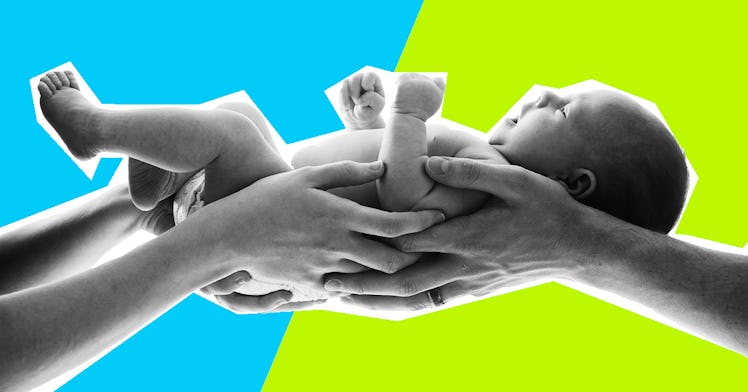Why You Shouldn’t Split Parental Responsibilities 50/50
Dividing parental responsibilities evenly isn't always the best play.

Most parents probably expect a bunch of new duties when they have a baby. But that doesn’t help couples split up the duties of a parent. Some dads might think they have a lock on the duties of a husband, but even the men who want to be as fair as possible may not be getting enough done. For instance, you knew you’d be rocking feeding and changing diapers. But according to a survey of millennial parents 95 percent of moms claimed to do more diaper changing than their significant other, while 75 percent of dads insisted they did. In the same survey, 80 percent of women said they’d be more likely to change dirty diapers than their significant other, while only 43 percent of men said the same. That doesn’t particularly bode well for splitting the duties of a parent equitably.
READ MORE: The Fatherly Guide to Poop, Diapers, and Potty Training
But when it comes to happiness, intimacy, and overall relationship satisfaction, who does more matters less than a clear understanding of who does what. So says couples therapist Laura Silverstein, clinical director and co-owner of Main Line Counseling Partners, with her husband — so you know she practices what she preaches.
Conflict in the Duties of a Parent Is Inevitable
Because humans can’t have nice things, the happiest moment of your life — the birth of a child — is also the moment you’re most likely to call someone like Silverstein to prevent your relationship from crumbling. That’s because you and your partner now have more work to do and less money to do it with. Oh, and you’re both sleep deprived zombies. “Sleep deprivation is how you torture people. It’s a big deal that everyone’s walking around exhausted,” Silverstein says. Simply put, couples with small kids very rarely avoid conflicts about the division of labor.
“Nobody is getting any sleep, there’s so much laundry, all those bottles need to be sterilized, and by the way, who’s rocking the baby to bed?” Diaper changing factors in there, too, because, as Silverstein notes, “Babies poop a lot. You can quote me on that.” Thanks — wouldn’t want to be accused of stealing that highly original thought. Silverstein admits she and her husband struggled with the same challenges, but they got through it, and with her help, so will you.
Everyone’s Doing Too Much
Silverstein isn’t surprised by the survey’s results because people tend to see things from their own perspective and thus have a tough time believing anyone else could possibly be working as hard as they are. When couples arrive at her office, however, Silverstein finds that everyone — men and women alike — believes they’re doing more than they can capably sustain. Recognizing that everyone is at the end of their rope is the first step to overcoming conflicts about who’s doing more.
“You come home from work, you’re exhausted, you feel like you can’t go another day without a full night’s sleep, but yet again you have to wake up in the middle of the night. It’s hard not to feel resentment if you see somebody sleeping in bed next to you, but guess what? They’re gonna wake up in 3 hours, too.”
Collaboration in Parental Responsibilities Beats Competition
Constant competing leaves couples feeling lonely, disconnected, and dissatisfied, emotionally and physically. Walking that path leads either to “A high-conflict environment or a business relationship where you’re just going through the motions,” both of which sound like they ought to be the road less traveled.
Instead, Silverstein says, tackle your individual stresses together through collaboration and mutual support. “This new baby is amazing but also really difficult. We both want to be connected to the new life that’s joined our family but also be connected and stay sexual beings with one another. Let’s be in this soup together; you and me against the world.” The team-oriented approach leads to greater happiness and emotional intimacy, which leads to physical intimacy and, after a pep talk like that, multiple championships.
Discuss, Divide, And Conquer Parental Responsibilities
Silverstein affirms, “People have the greatest relationship satisfaction when they both have a clear understanding of the division of labor and household responsibilities. The deciding factor isn’t who does more but the clarity around whose job it is to do what.” So the fairest split isn’t always 50/50.
Silverstein literally gives couples a checklist of every household chore — 136 of them, to be exact — and has them tick off who does what currently and who’d do what ideally. The result can be like that survey: both people think they do everything. But it leads to a collaborative discussion and a clear, equitable plan about who will do what. “Usually, there’s a higher level of happiness once there’s been a discussion about it, while there’s actually less happy with a 50/50 split because it’s unusual for people to feel exactly the same about each chore,” Silverstein says. Which makes complete sense — if you prefer kitty litter to human waste, but for your partner, it’s vice versa, do that. Happy poops for all!
The key is to have a clear, direct, and honest conversation in advance, at a mutually agreed upon time. Nobody feels collaborative when they’re wrist-deep in poo at 3:00 AM. Again.
Note that Silverstein isn’t simply saying it’s better to divide all the jobs than share some. Most likely, your diaper changing plan will look something like, “I’ll take 6:00 AM since I’m up getting ready for work and you can take midnight since you’re up watching cartoons.” Every situation is different, but if you have a direct conversation about mutually agreed upon expectations in advance, you’ll avoid having the chores, arguments, and dirty diapers pile up.
This article was originally published on